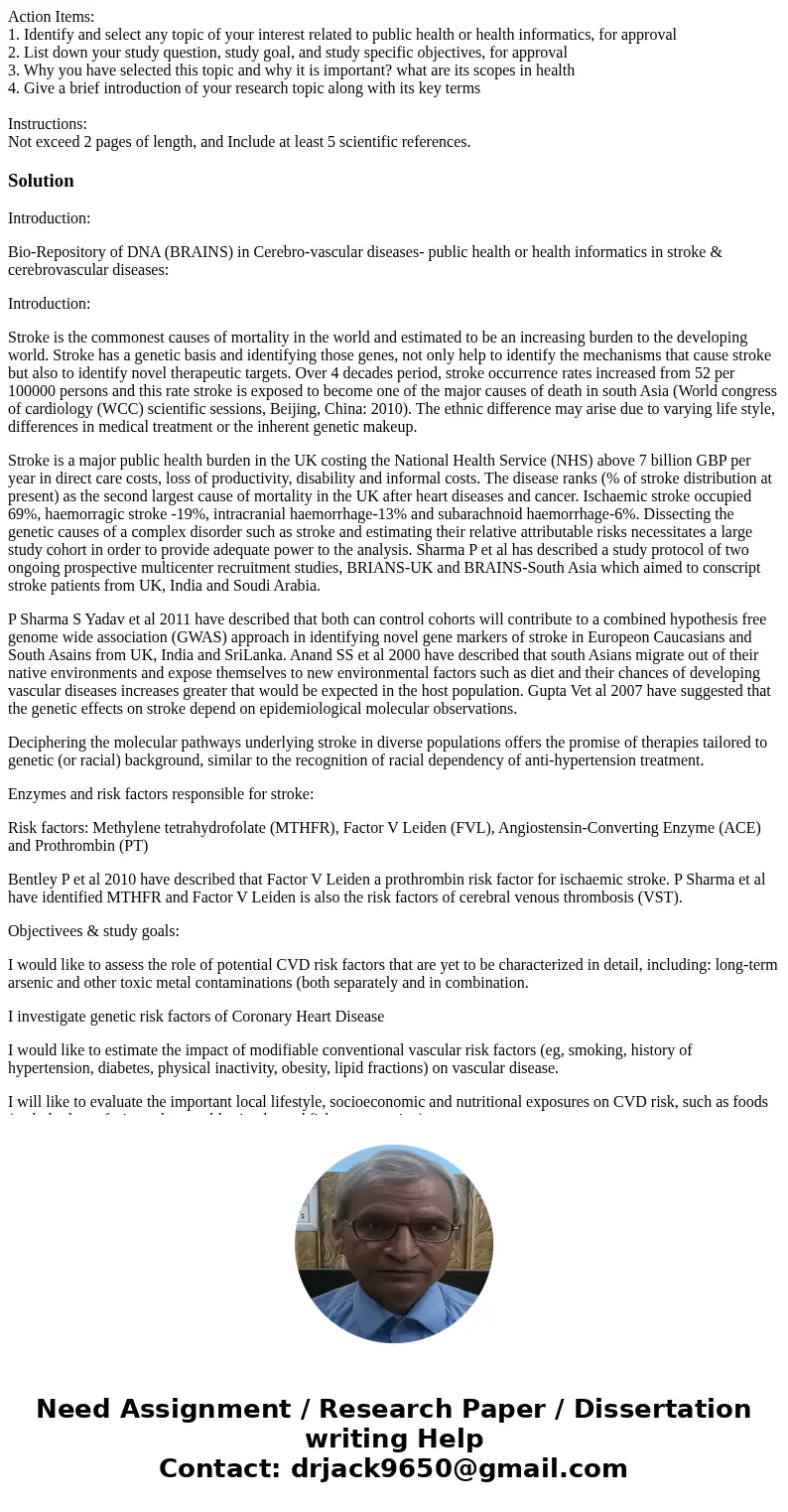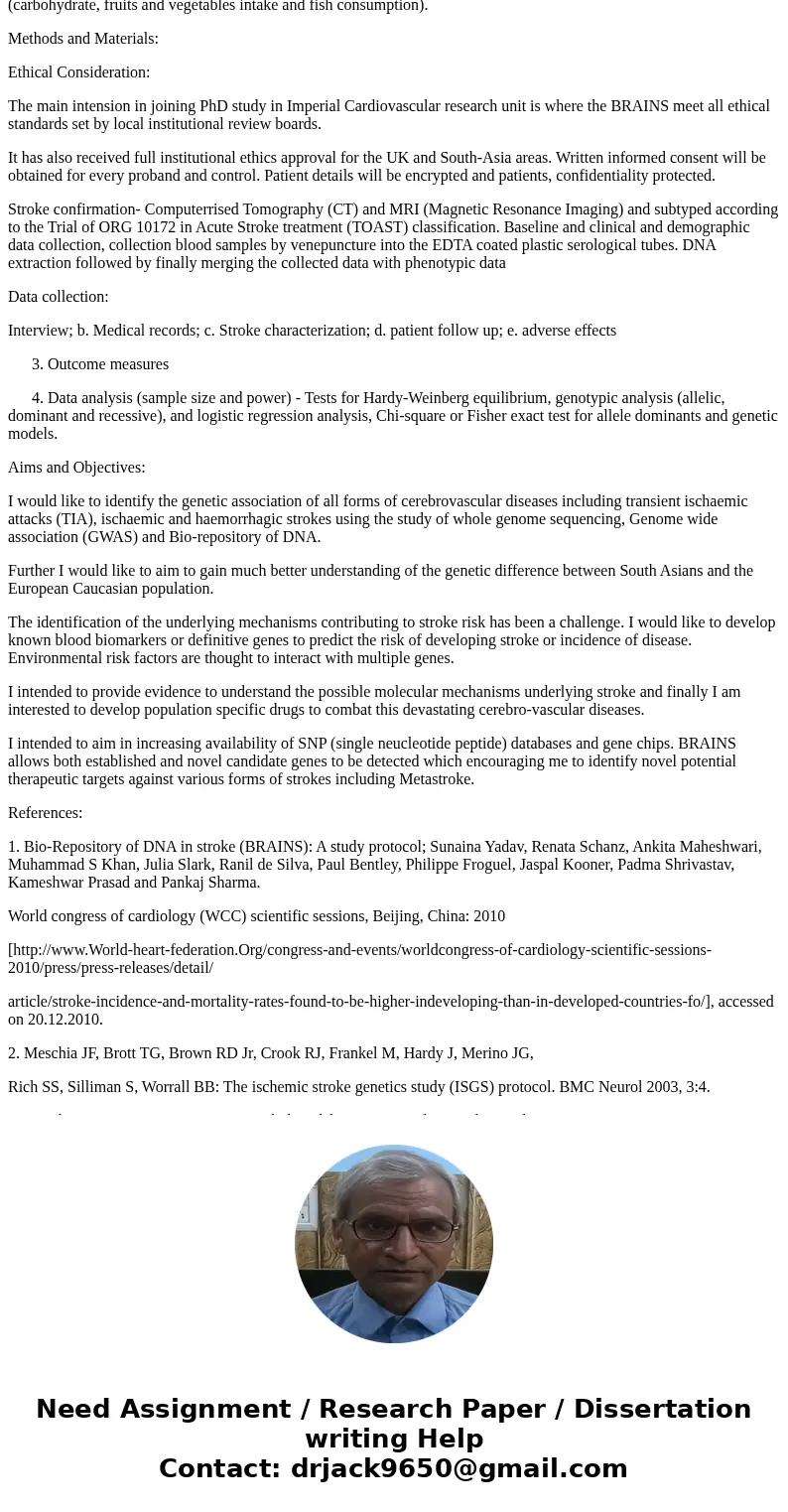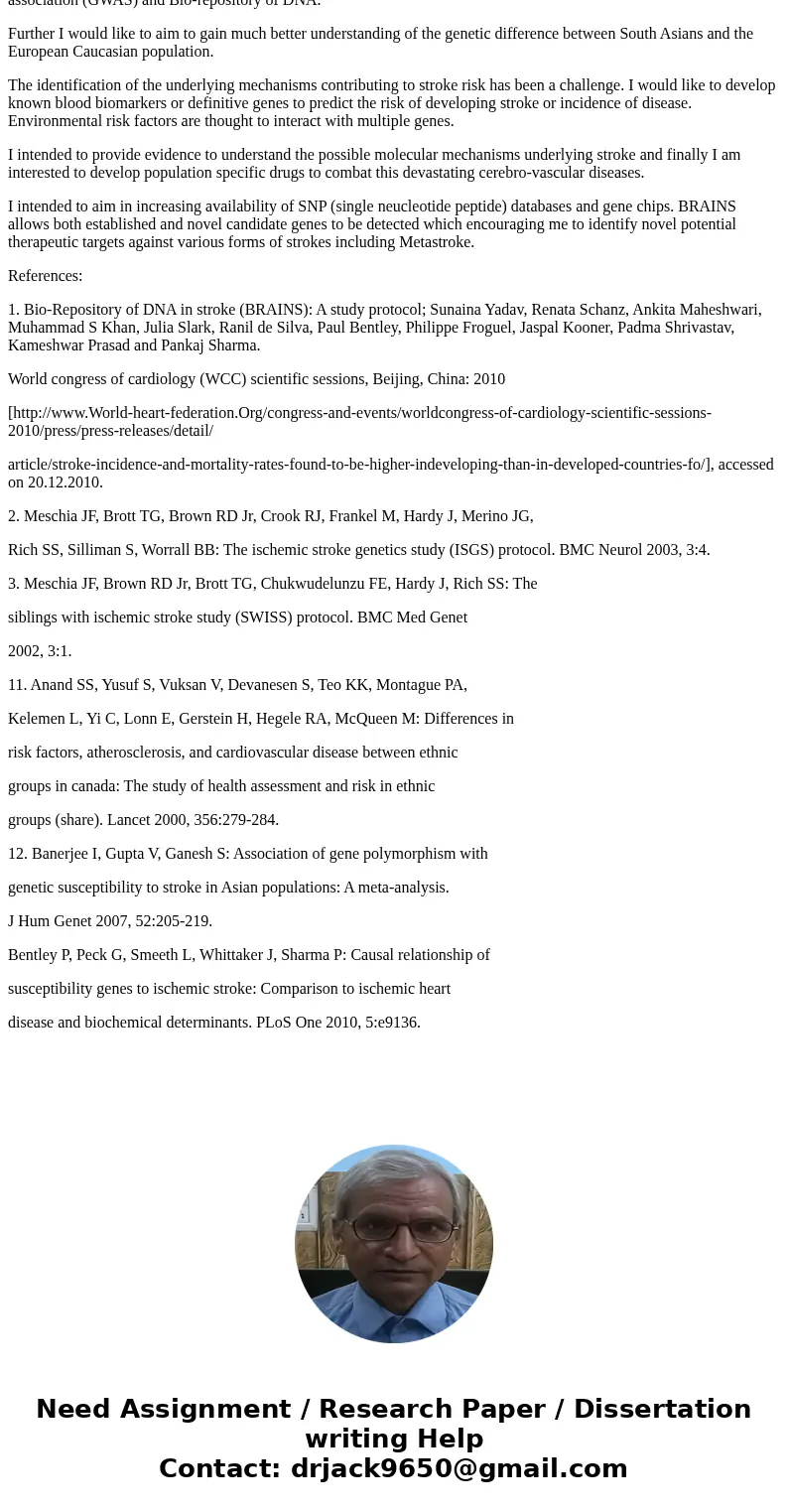Action Items 1 Identify and select any topic of your interes
Action Items:
1. Identify and select any topic of your interest related to public health or health informatics, for approval
2. List down your study question, study goal, and study specific objectives, for approval
3. Why you have selected this topic and why it is important? what are its scopes in health
4. Give a brief introduction of your research topic along with its key terms
Instructions:
Not exceed 2 pages of length, and Include at least 5 scientific references.
Solution
Introduction:
Bio-Repository of DNA (BRAINS) in Cerebro-vascular diseases- public health or health informatics in stroke & cerebrovascular diseases:
Introduction:
Stroke is the commonest causes of mortality in the world and estimated to be an increasing burden to the developing world. Stroke has a genetic basis and identifying those genes, not only help to identify the mechanisms that cause stroke but also to identify novel therapeutic targets. Over 4 decades period, stroke occurrence rates increased from 52 per 100000 persons and this rate stroke is exposed to become one of the major causes of death in south Asia (World congress of cardiology (WCC) scientific sessions, Beijing, China: 2010). The ethnic difference may arise due to varying life style, differences in medical treatment or the inherent genetic makeup.
Stroke is a major public health burden in the UK costing the National Health Service (NHS) above 7 billion GBP per year in direct care costs, loss of productivity, disability and informal costs. The disease ranks (% of stroke distribution at present) as the second largest cause of mortality in the UK after heart diseases and cancer. Ischaemic stroke occupied 69%, haemorragic stroke -19%, intracranial haemorrhage-13% and subarachnoid haemorrhage-6%. Dissecting the genetic causes of a complex disorder such as stroke and estimating their relative attributable risks necessitates a large study cohort in order to provide adequate power to the analysis. Sharma P et al has described a study protocol of two ongoing prospective multicenter recruitment studies, BRIANS-UK and BRAINS-South Asia which aimed to conscript stroke patients from UK, India and Soudi Arabia.
P Sharma S Yadav et al 2011 have described that both can control cohorts will contribute to a combined hypothesis free genome wide association (GWAS) approach in identifying novel gene markers of stroke in Europeon Caucasians and South Asains from UK, India and SriLanka. Anand SS et al 2000 have described that south Asians migrate out of their native environments and expose themselves to new environmental factors such as diet and their chances of developing vascular diseases increases greater that would be expected in the host population. Gupta Vet al 2007 have suggested that the genetic effects on stroke depend on epidemiological molecular observations.
Deciphering the molecular pathways underlying stroke in diverse populations offers the promise of therapies tailored to genetic (or racial) background, similar to the recognition of racial dependency of anti-hypertension treatment.
Enzymes and risk factors responsible for stroke:
Risk factors: Methylene tetrahydrofolate (MTHFR), Factor V Leiden (FVL), Angiostensin-Converting Enzyme (ACE) and Prothrombin (PT)
Bentley P et al 2010 have described that Factor V Leiden a prothrombin risk factor for ischaemic stroke. P Sharma et al have identified MTHFR and Factor V Leiden is also the risk factors of cerebral venous thrombosis (VST).
Objectivees & study goals:
I would like to assess the role of potential CVD risk factors that are yet to be characterized in detail, including: long-term arsenic and other toxic metal contaminations (both separately and in combination.
I investigate genetic risk factors of Coronary Heart Disease
I would like to estimate the impact of modifiable conventional vascular risk factors (eg, smoking, history of hypertension, diabetes, physical inactivity, obesity, lipid fractions) on vascular disease.
I will like to evaluate the important local lifestyle, socioeconomic and nutritional exposures on CVD risk, such as foods (carbohydrate, fruits and vegetables intake and fish consumption).
Methods and Materials:
Ethical Consideration:
The main intension in joining PhD study in Imperial Cardiovascular research unit is where the BRAINS meet all ethical standards set by local institutional review boards.
It has also received full institutional ethics approval for the UK and South-Asia areas. Written informed consent will be obtained for every proband and control. Patient details will be encrypted and patients, confidentiality protected.
Stroke confirmation- Computerrised Tomography (CT) and MRI (Magnetic Resonance Imaging) and subtyped according to the Trial of ORG 10172 in Acute Stroke treatment (TOAST) classification. Baseline and clinical and demographic data collection, collection blood samples by venepuncture into the EDTA coated plastic serological tubes. DNA extraction followed by finally merging the collected data with phenotypic data
Data collection:
Interview; b. Medical records; c. Stroke characterization; d. patient follow up; e. adverse effects
3. Outcome measures
4. Data analysis (sample size and power) - Tests for Hardy-Weinberg equilibrium, genotypic analysis (allelic, dominant and recessive), and logistic regression analysis, Chi-square or Fisher exact test for allele dominants and genetic models.
Aims and Objectives:
I would like to identify the genetic association of all forms of cerebrovascular diseases including transient ischaemic attacks (TIA), ischaemic and haemorrhagic strokes using the study of whole genome sequencing, Genome wide association (GWAS) and Bio-repository of DNA.
Further I would like to aim to gain much better understanding of the genetic difference between South Asians and the European Caucasian population.
The identification of the underlying mechanisms contributing to stroke risk has been a challenge. I would like to develop known blood biomarkers or definitive genes to predict the risk of developing stroke or incidence of disease. Environmental risk factors are thought to interact with multiple genes.
I intended to provide evidence to understand the possible molecular mechanisms underlying stroke and finally I am interested to develop population specific drugs to combat this devastating cerebro-vascular diseases.
I intended to aim in increasing availability of SNP (single neucleotide peptide) databases and gene chips. BRAINS allows both established and novel candidate genes to be detected which encouraging me to identify novel potential therapeutic targets against various forms of strokes including Metastroke.
References:
1. Bio-Repository of DNA in stroke (BRAINS): A study protocol; Sunaina Yadav, Renata Schanz, Ankita Maheshwari, Muhammad S Khan, Julia Slark, Ranil de Silva, Paul Bentley, Philippe Froguel, Jaspal Kooner, Padma Shrivastav, Kameshwar Prasad and Pankaj Sharma.
World congress of cardiology (WCC) scientific sessions, Beijing, China: 2010
[http://www.World-heart-federation.Org/congress-and-events/worldcongress-of-cardiology-scientific-sessions-2010/press/press-releases/detail/
article/stroke-incidence-and-mortality-rates-found-to-be-higher-indeveloping-than-in-developed-countries-fo/], accessed on 20.12.2010.
2. Meschia JF, Brott TG, Brown RD Jr, Crook RJ, Frankel M, Hardy J, Merino JG,
Rich SS, Silliman S, Worrall BB: The ischemic stroke genetics study (ISGS) protocol. BMC Neurol 2003, 3:4.
3. Meschia JF, Brown RD Jr, Brott TG, Chukwudelunzu FE, Hardy J, Rich SS: The
siblings with ischemic stroke study (SWISS) protocol. BMC Med Genet
2002, 3:1.
11. Anand SS, Yusuf S, Vuksan V, Devanesen S, Teo KK, Montague PA,
Kelemen L, Yi C, Lonn E, Gerstein H, Hegele RA, McQueen M: Differences in
risk factors, atherosclerosis, and cardiovascular disease between ethnic
groups in canada: The study of health assessment and risk in ethnic
groups (share). Lancet 2000, 356:279-284.
12. Banerjee I, Gupta V, Ganesh S: Association of gene polymorphism with
genetic susceptibility to stroke in Asian populations: A meta-analysis.
J Hum Genet 2007, 52:205-219.
Bentley P, Peck G, Smeeth L, Whittaker J, Sharma P: Causal relationship of
susceptibility genes to ischemic stroke: Comparison to ischemic heart
disease and biochemical determinants. PLoS One 2010, 5:e9136.



 Homework Sourse
Homework Sourse